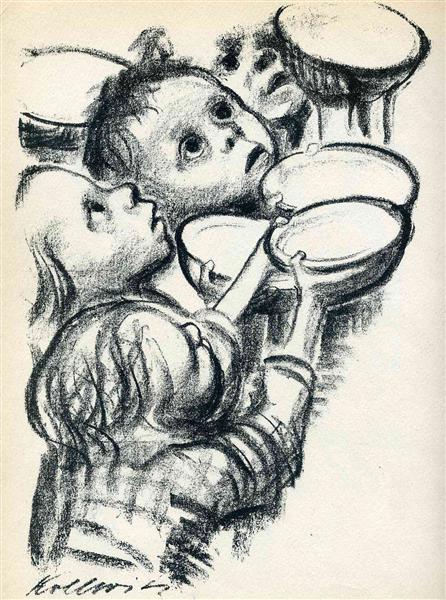Description
The work "German children starve!" From Käthe Kollwitz, created in 1924, is erected as a powerful visual testimony of suffering and hopelessness in the context of postwar Germany. This painting, that belongs to a series of works that the artist dedicated to the issues of hunger and child vulnerability, reveals the urgent reality of a nation devastated by war and the subsequently devastating economic crises that harassed her.
The composition of the work radiates a feeling of hopelessness. In its center, a group of malnourished children is presented with a palpable emotionality load. Their thin and emaciated bodies are grouped, expressing a sense of unity in suffering. Kollwitz uses a darke and off color palette, dominated by gray, black and brown tones, which emphasizes the severity of the situation. The general atmosphere of the painting suggests a climate of oppression and sadness, reflecting the pain of those who have been stripped of their well -being and dignity.
The eyes of the children, large and unprotected, seem to look in the distance that relief that never arrives. This look captures the viewer's attention, establishing an immediate emotional bond. Through their representation, Kollwitz not only portrays children as victims, but also makes them symbols of a humanity into crisis. His expressions, which range between resignation and despair, allow Kollwitz to channel his indignation against social injustices and the consequences of political decisions.
In addition to being a work that reflects a painful social criticism, "German children are starving!" It is also a milestone in Kollwitz's artistic production. The artist, recognized for her activism in favor of human rights, enters a territory where painting becomes a protest vehicle. His style, with roots in expressionism, goes beyond mere aesthetic representation; It is immersed in the emotional impact and the representation of humanity in its most vulnerable form.
Kollwitz enrolls within the tradition of a committed art, where aesthetics merges with social justice. His recurring themes, which often highlight the struggle of working classes, motherhood in crisis situations and the fight against oppression, resonate strongly in this particular work. As in other pieces such as "the mother" and "El Duel", children in this painting become the incarnation of a collective pain that demands attention and action.
It is essential to recognize that, although "German children are starving!" It is based on a specific context, its message transcends borders and times. In the 21st century, the fight against hunger and child poverty remains a hot and relevant issue. Thus, this painting not only serves as a historical document, but also as a call to action, a reminder that human suffering is an issue that should not be ignored.
In conclusion, this masterpiece of Käthe Kollwitz not only presents itself as a reflection of the suffering of a generation, but also stands as a powerful symbol of resistance and a reminder of the need for empathy and commitment to our contemporary world. Through his art, Kollwitz invites us to confront our own realities and assume responsibility for a deep change in society.
KUADROS ©, a famous paint on your wall.
Hand-made oil painting reproductions, with the quality of professional artists and the distinctive seal of KUADROS ©.
Art reproduction service with satisfaction guarantee. If you are not completely satisfied with the replica of your painting, we refund your money 100%.

